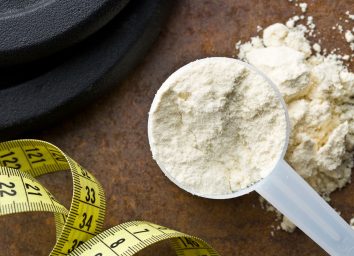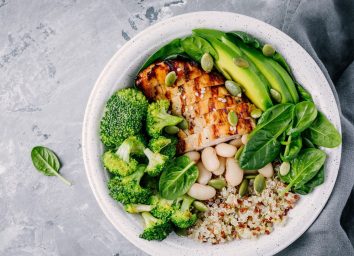Beloved Foods That Make You Gain Weight, According to Doctors
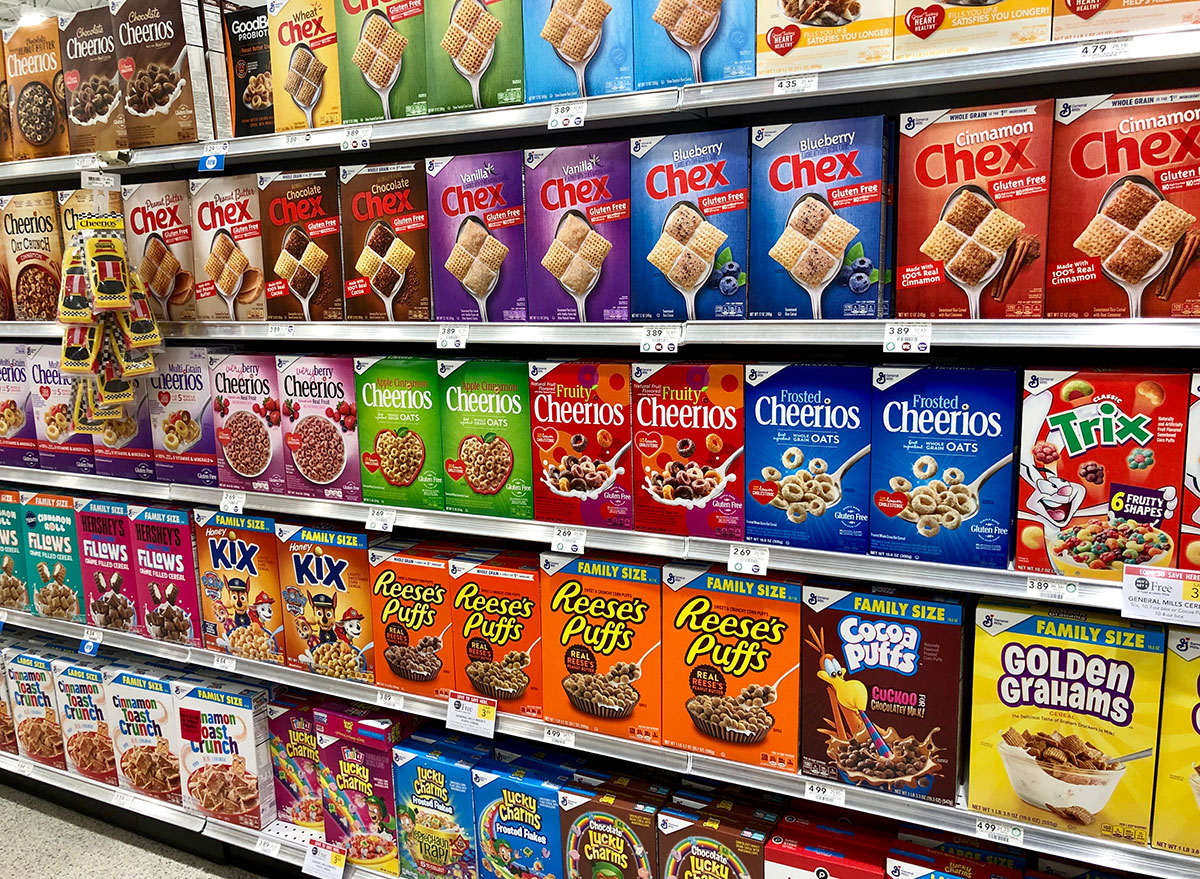
Who doesn't love to indulge in a fudgy brownie? How about treating yourself to a large frappuccino with dollops of whipped cream? While these beloved foods are tasty on the tongue, if eaten in excess, they are certainly foods that make you gain weight.
But how do they make you gain weight, and why? We turned to resources from doctors to learn about why these particular foods are making you gain weight. All-in-all, these beloved foods should be eaten in moderation. There's nothing wrong with treating yourself to a brownie or a can of soda every now-and-then. It's eating these types of foods in excess on a regular, daily basis that can cause weight gain over time.
So here are the beloved foods that make you gain weight, and for more healthy eating tips, be sure to check out our list of 21 Best Healthy Cooking Hacks of All Time.
Refined carbs

Those packaged breads, pastries, and desserts sure taste good, but they aren't doing your health any favors. Refined carbs are foods that have been stripped of their nutritional content—like the natural fiber, essential fatty acids, vitamins, and minerals—and typically are loaded with sugar and high fructose corn syrup.
In his article published by SF Gate, Michael R. Peluso, Ph.D., writes that refined carbs lower the thermic effect of your meals which causes your metabolic rate to decrease and results in weight gain. He mentions that these foods tend to have a higher glycemic index, which means it will raise your blood sugar levels. Too much of it can result in an increased risk of developing Type 2 diabetes.
However, this doesn't mean carbs are bad! In fact, there are a lot of healthy carbs you should be eating regularly in your diet. Especially the carbs that are packed with dietary fiber, which actually helps you to lose weight. Simply making swaps in your diet to avoid the refined "simple" carbs and choosing unprocessed carbohydrate foods, your health (and weight) will experience a huge difference. Here's What Happens When You Don't Eat Enough Fiber.
Soda
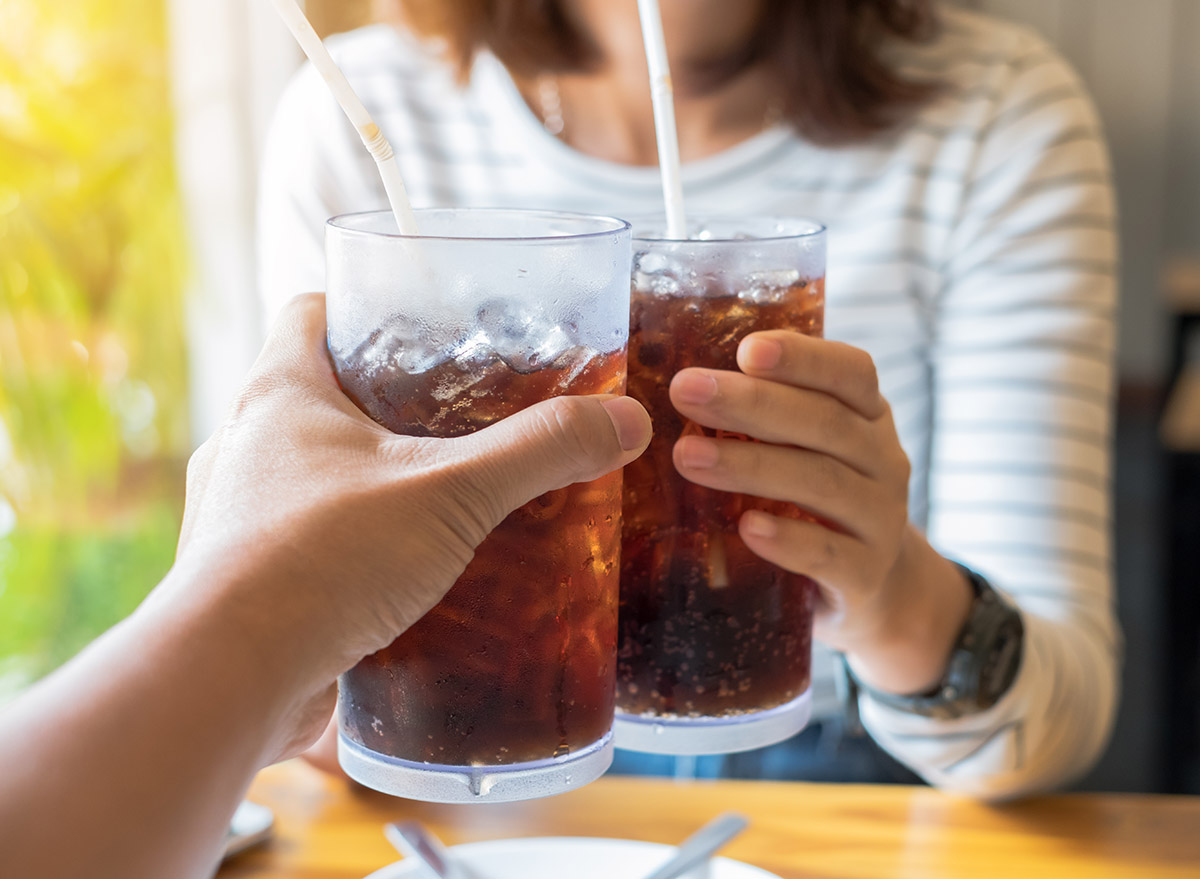
A can of cola truly is a beloved food by many around the world. But because these drinks are loaded with high fructose corn syrup, they are linked to causing serious health problems later down the line, including weight gain.
Martina M. Cartwright, Ph.D. and RD, explains in her Psychology Today article that high fructose corn syrup was added to most sodas in the mid-1980s, and is a common sweetener used in beverages like soda. Unlike other countries that sweeten their carbonated beverages with cane sugar. High fructose corn syrup is a combination of fructose (sugar that comes from fruit) and glucose and is less expensive to produce compared to cane sugar. Hence the switch for mass distribution.
A study published by The Journal of Nutrition shows that consuming fructose at higher rates can cause blood sugar levels to spike and even triggers your hunger hormone, leptin, leaving you feeling hungrier afterward. However, Cartwright makes it clear that having a can of soda every now and then won't totally destroy your weight loss efforts. She mentions it is important to abstain from a sedentary lifestyle and to sip on soda in moderation.
Here are 40 Side Effects of Drinking Too Much Soda.
Fried foods
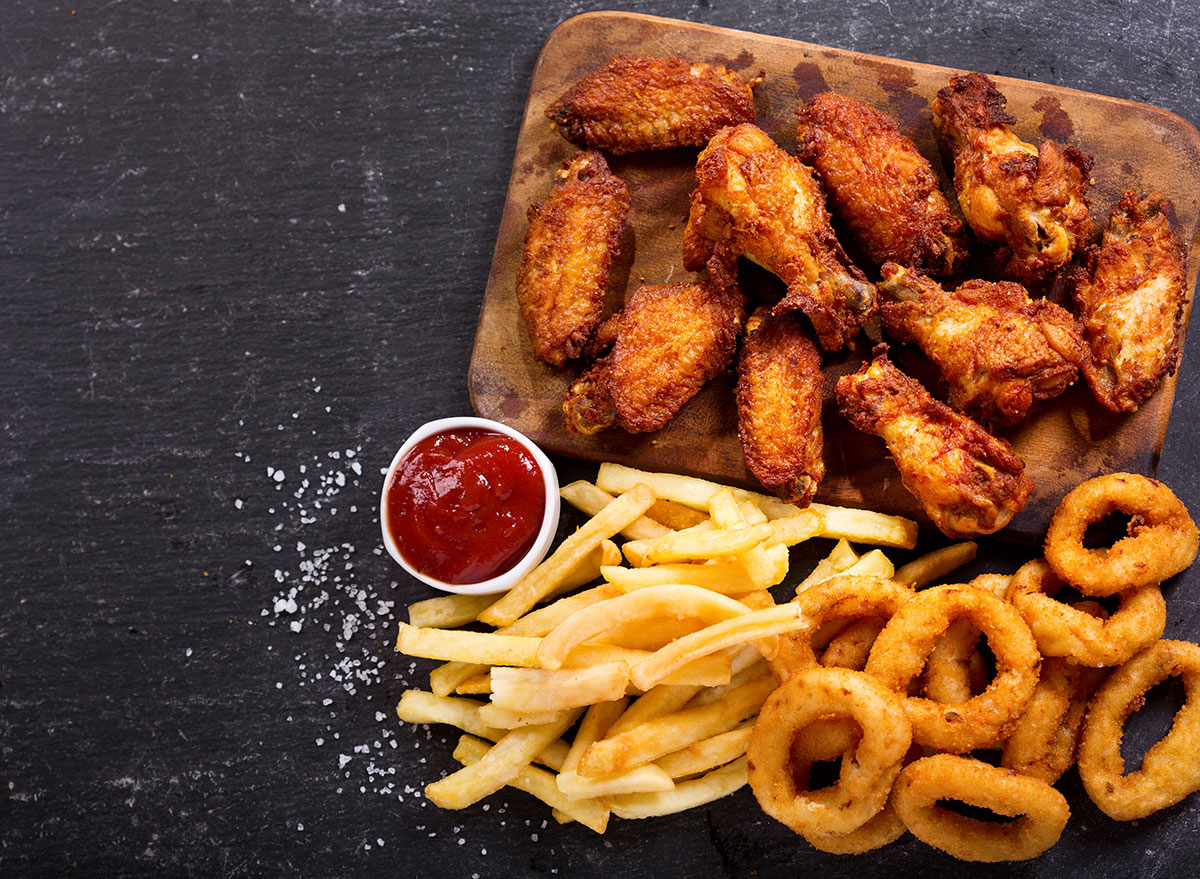
Let us be clear: The foods that are being fried aren't the problem. Chicken, potatoes, and onions are all great foods to have in your regular diet. It's the added empty calories and grams of fat that can cause weight gain.
Study after study will show you the links between processed, fried fast food and weight gain. In one study published by BioMed Central (BMC) Public Health, it's clear that fast food consumption causes an increased risk of obesity in children. The American Journal of Clinical Nutrition published a study focusing on linked general obesity and fried foods among both men and women. Plus, according to Healthline, an increased intake of these foods can create the risk of even more health conditions like heart disease, diabetes, stroke, and even cancer.
The consumption of some fat is not the problem. In fact, having a good amount of healthy fat in your diet is important for your satiety levels and weight loss. It's the consumption of increased trans fat that causes these issues, which comes from chemically altered vegetable oils—typically used to fry foods.
Speaking of, This Is What Happens To Your Body When You Eat Deep-Fried Foods.
Highly processed packaged foods
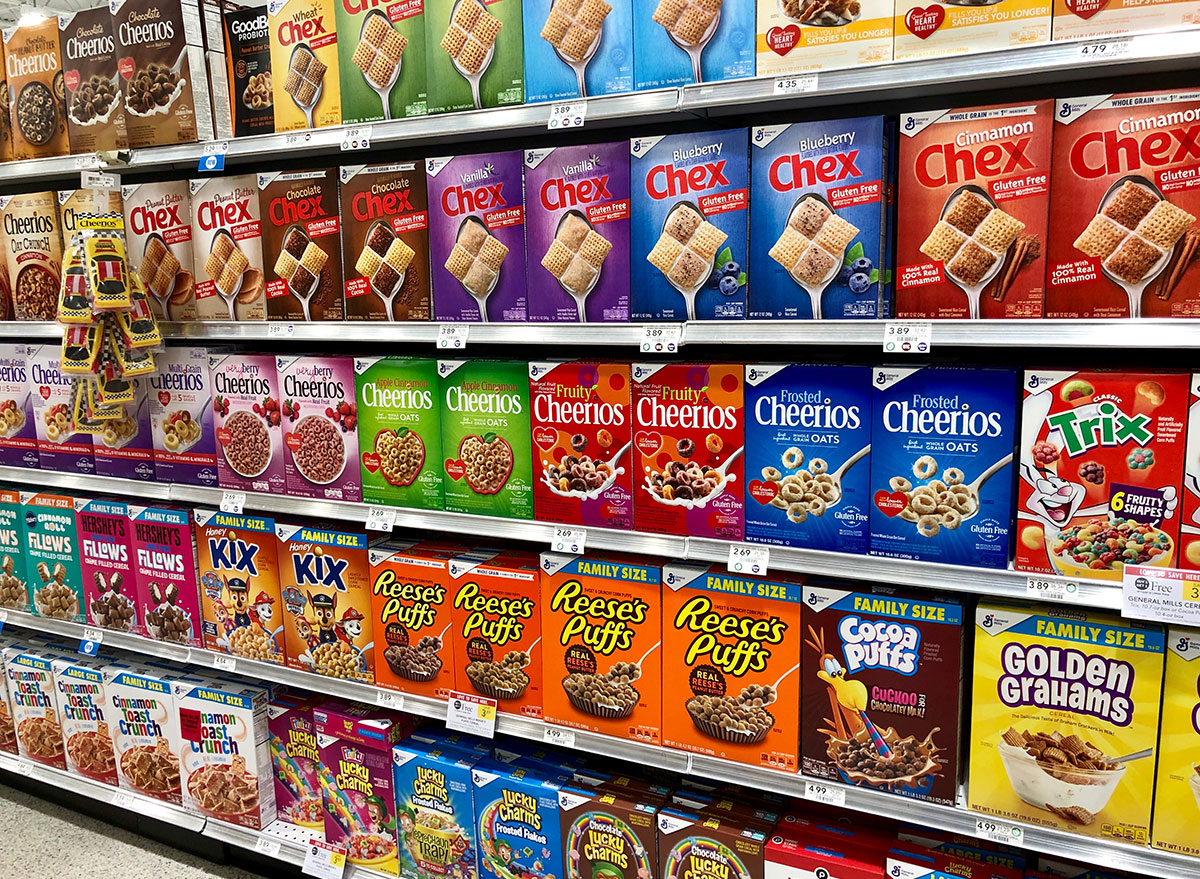
Similar to refined carbs, highly processed packaged foods are typically stripped of their nutritional value, contain a myriad of chemicals and ingredients, and almost always contain high levels of high fructose corn syrup or sugars of some kind. This includes your beloved cereals, potato chips, and other packaged snacks.
So how are they part of the foods that make you gain weight? Truthfully, these foods are never filling enough, and cause people to eat more calories than they should for their natural body weight. According to the Clinical and Translational Report published by Cell Metabolism, a diet of ultra-processed foods can cause weight gain for adults. In this study, the participants received either a diet of ultra-processed or unprocessed foods within a 14 day period, and the diets had a matched amount of calories, sugar, fat, fiber, and macronutrients. Those who were part of the ultra-processed food group did end up consuming more calories (with increased carbohydrates and no added protein) compared to the unprocessed food groups and did experience weight gain. This proves that eating a diet of unprocessed foods is effective in maintaining weight loss and preventing obesity.
Sugary coffee drinks
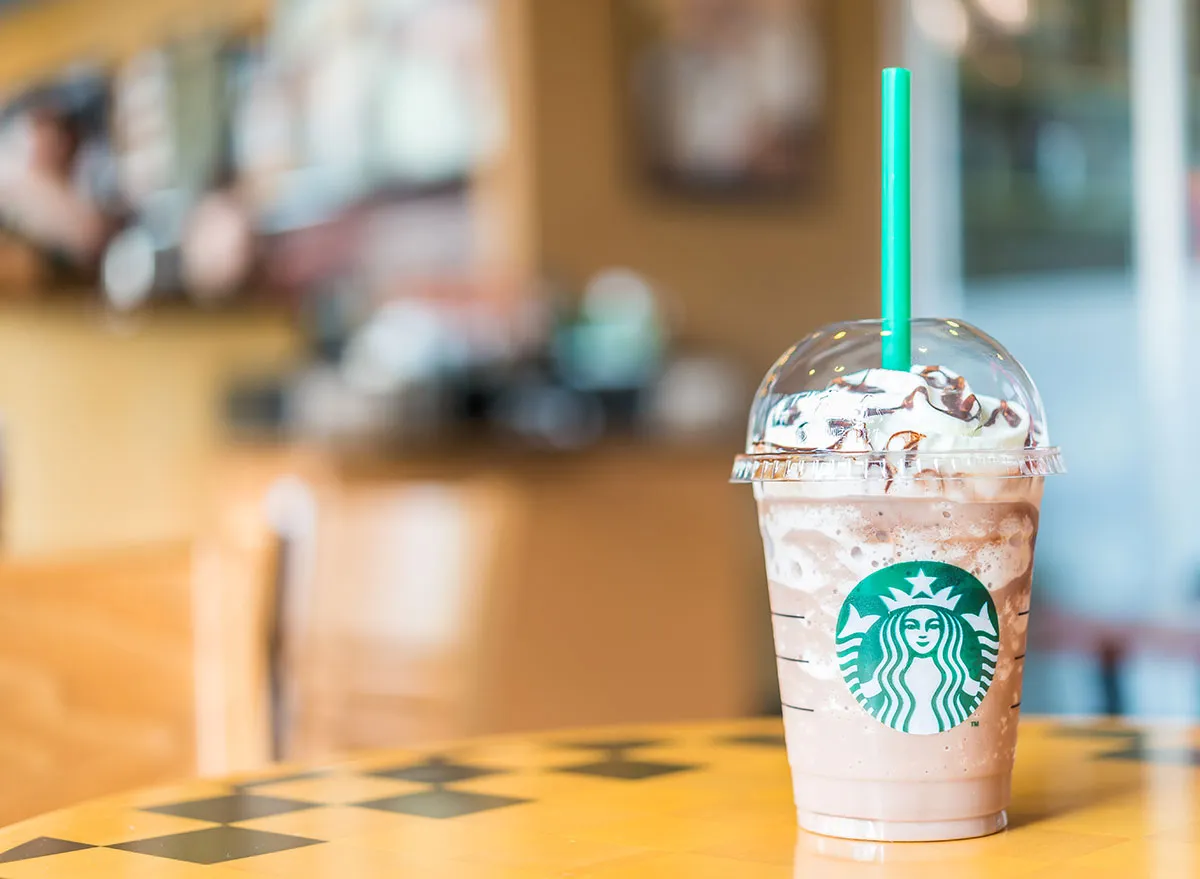
A cup of coffee, or even a regular whole-milk latte, is perfectly fine for a healthy diet. In fact, most regular coffee drinks without flavoring tend to be lower in overall sugar and fat content.
But this isn't the case for most of those blended frappuccinos or calorie-bomb lattes, which include all of those added syrups and sweeteners bursting with sugar. It's fine to have as a treat once in a blue moon, but having these drinks on a daily basis to get your caffeine fix certainly isn't doing your health any favors. The reason is due to an increased intake of added sugars on a regular basis.
Again, having some sugar is not bad for your diet. In fact, there are many naturally occurring sugars in the foods you regularly consume, like fruit and milk.
However, consuming a lot of food with added sugars can wreak havoc on your body. Added sugars can be found in soda, candy, desserts, sweetened yogurts, sugary cereals, and yes, your morning caramel latte. According to the American Heart Association, added sugars contain zero nutrients for the body yet increase added calories significantly. If you're not careful, you can be consuming a lot of calories and gaining weight by consuming products that have absolutely no nutritional value—leaving you feeling hungry after consuming it.
The Center for Disease Control (CDC) says that only 10% of your diet, or less, should include added sugars. That means if you're consuming a 2,000 calorie diet, you should only be consuming 200 calories of added sugars a day. And most of those sugary coffee drinks you grab at the coffee shop far exceed it.
Instead, why not whip up one of these 12 Tastiest Homemade Coffee Drinks From a Nutritionist?

